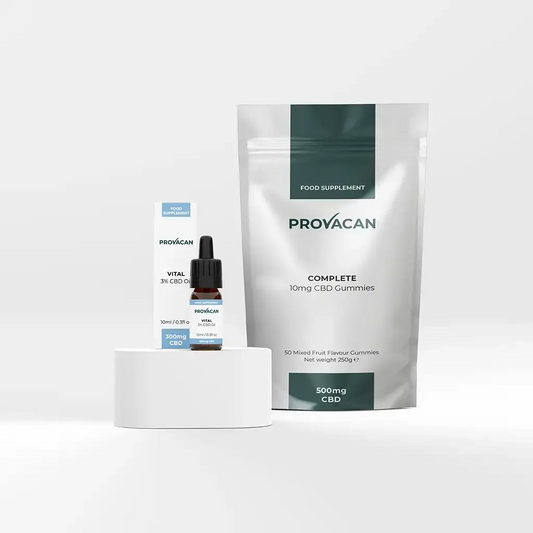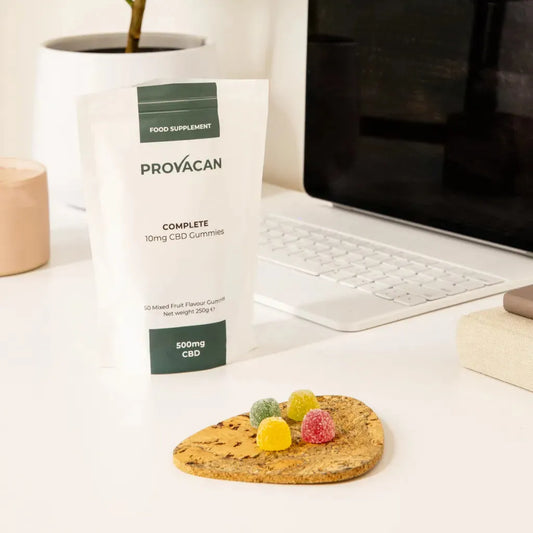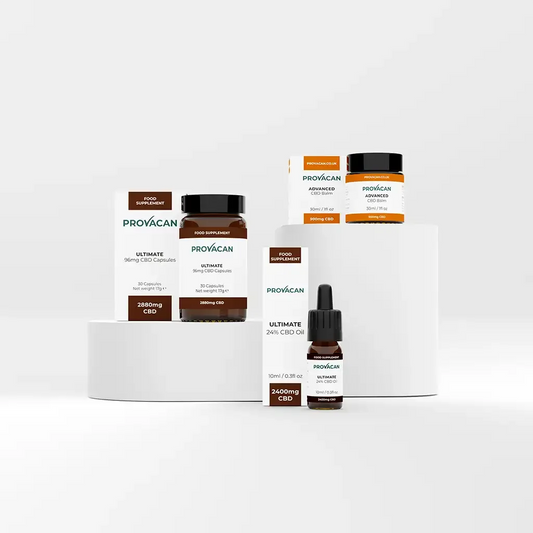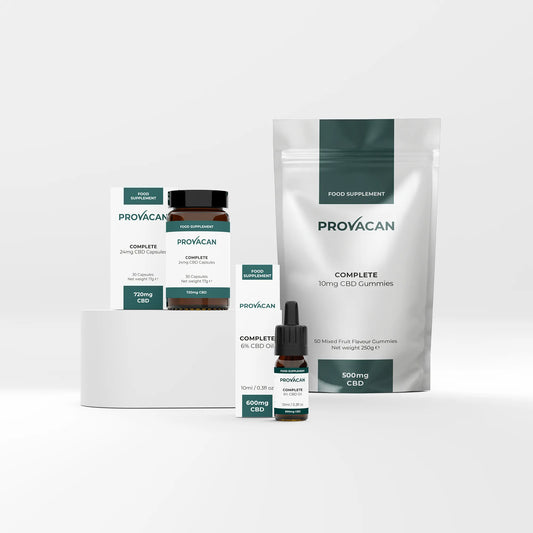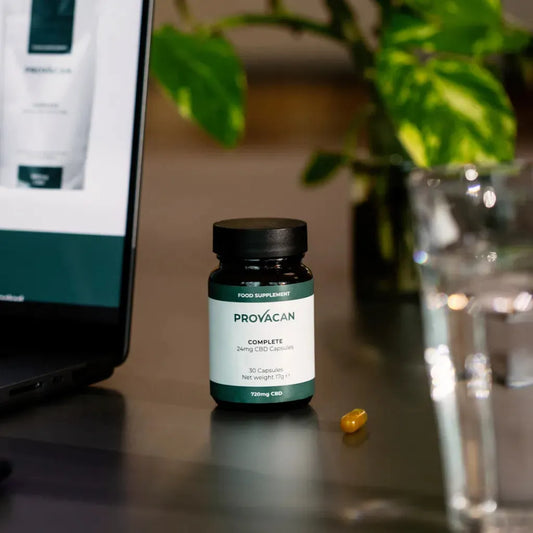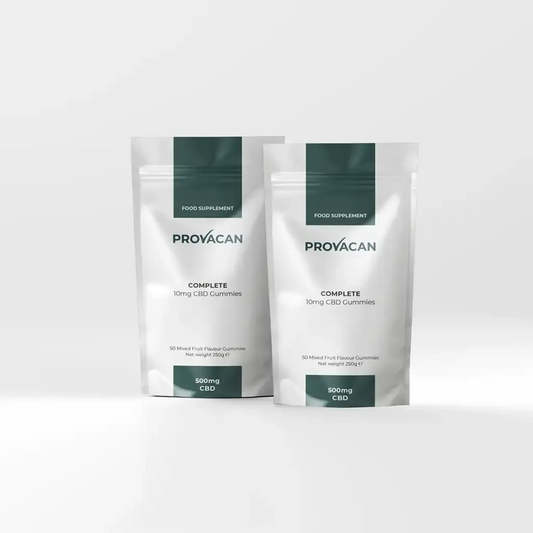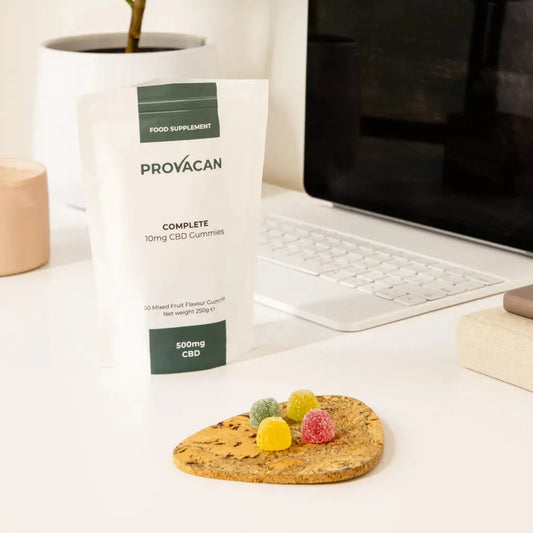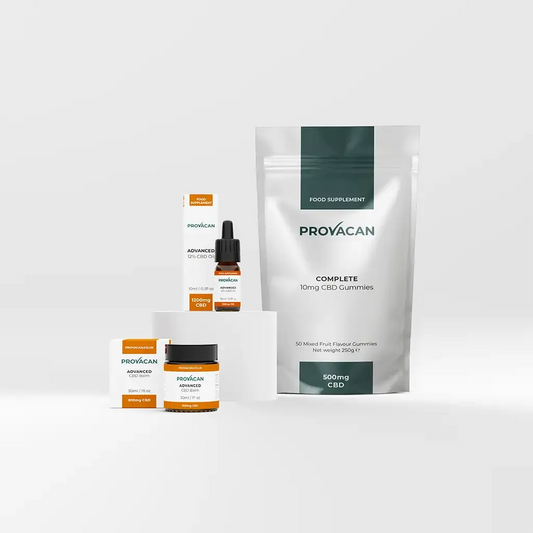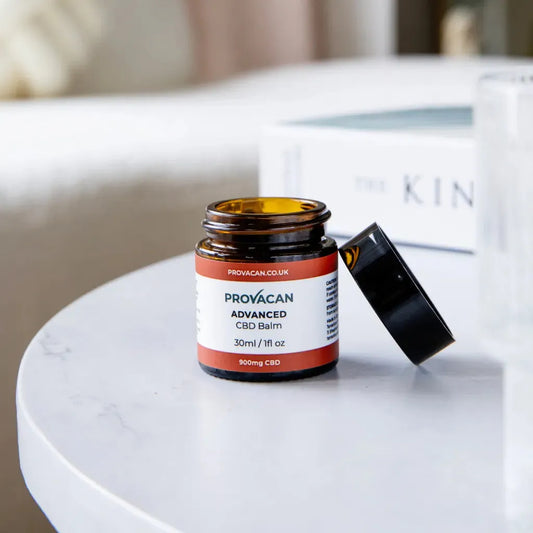Collection: CBD For Pain
In the realm of alternative health solutions, Cannabidiol (CBD) has emerged as a promising remedy for a multitude of ailments, with pain relief at the forefront. As the demand for natural and effective pain management grows, more individuals are turning to CBD products due to their potential to address discomfort without the side effects associated with traditional medications.
-
Book your free consultation
Get expert guidance on natural ways to support sleep, stress, and more.
BOOK NOW
-
Provacan Vital CBD Starter Kit
Regular price £39.99 GBPRegular priceUnit price / per£47.98 GBPSale price £39.99 GBPSale -
Provacan Ultimate CBD Starter Kit
Regular price £169.99 GBPRegular priceUnit price / per£209.97 GBPSale price £169.99 GBPSale -
Provacan Complete CBD Starter Kit
Regular price £74.49 GBPRegular priceUnit price / per£92.97 GBPSale price £74.49 GBPSale -
Provacan Complete CBD Gummies 100 Pack | 10mg CBD per gummy
Regular price £39.99 GBPRegular priceUnit price / per£45.98 GBPSale price £39.99 GBPSale -
Provacan Advanced CBD Starter Kit
Regular price £89.99 GBPRegular priceUnit price / per£112.97 GBPSale price £89.99 GBPSale
Exploring CBD for Pain Relief
CBD, short for cannabidiol, is a compound found in the Cannabis sativa plant. Unlike its counterpart, THC (tetrahydrocannabinol), CBD is non-intoxicating and does not produce the "high" typically associated with marijuana use. Research suggests that CBD may offer various health benefits, including the potential to alleviate pain.
When it comes to pain relief, CBD interacts with the body's endocannabinoid system (ECS). The ECS is a complex network of neurotransmitters that helps regulate functions such as pain perception, immune response, and mood. By influencing the endocannabinoid receptors, CBD may help reduce inflammation and pain sensations.
Several studies have indicated that CBD could be effective in managing different types of pain, including chronic pain conditions such as arthritis, neuropathic pain, and fibromyalgia. One study published in the European Journal of Pain found that CBD applied topically could help reduce arthritis-related pain and inflammation.
Furthermore, CBD is available in various forms, including oils, capsules, topicals, and gummies, making it a versatile option for individuals seeking pain relief. It's essential to note that the use of CBD for pain relief should be discussed with a healthcare professional, especially if you are considering it as a part of a treatment plan for a specific medical condition.
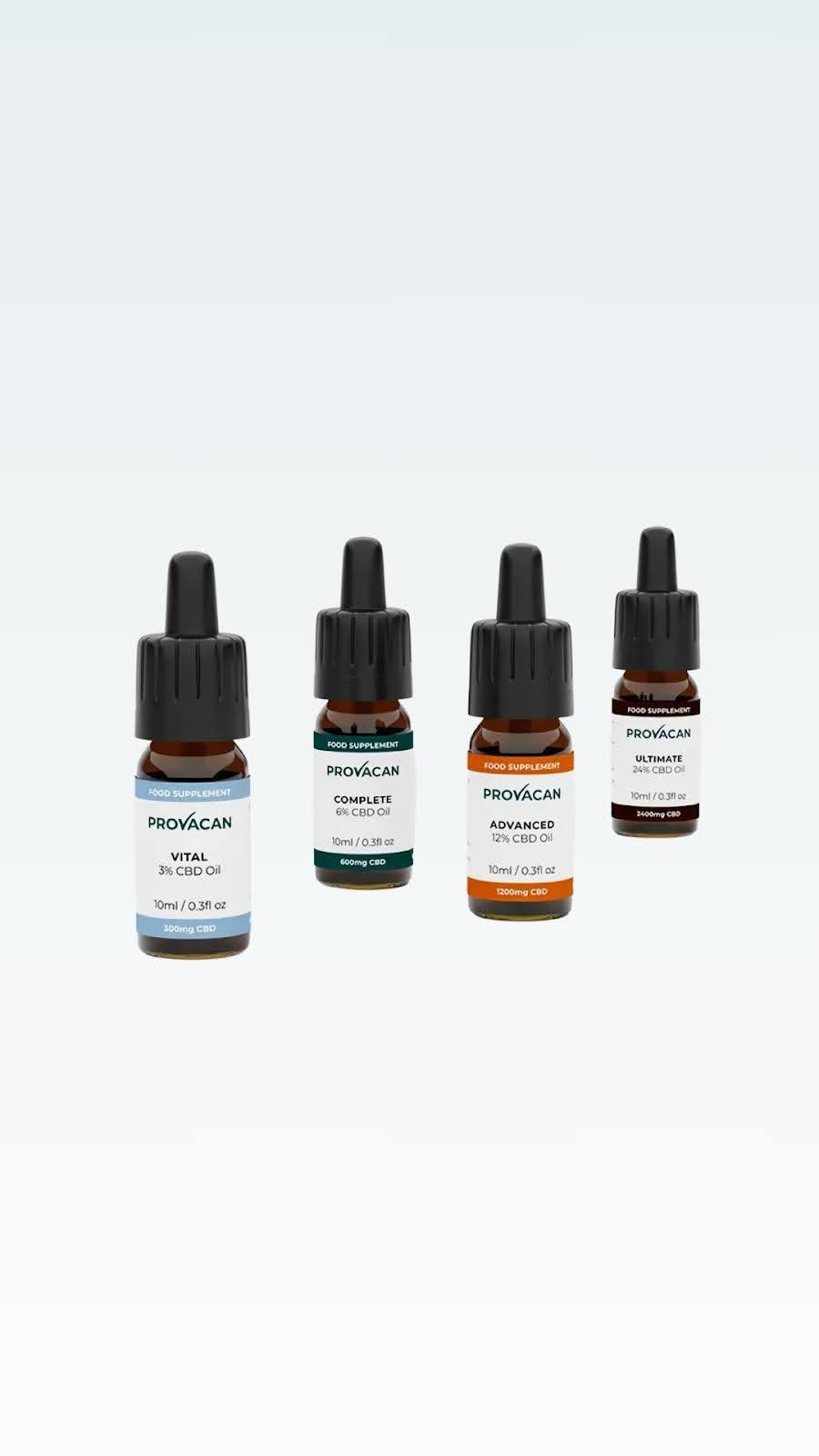
The Science Behind CBD and Pain Relief
Understanding how CBD interacts with the body to potentially provide relief from pain requires a deeper look into the science behind it.
Interaction with Endocannabinoid System (ECS): The ECS is a complex network of receptors and neurotransmitters that play a crucial role in regulating various physiological functions, including pain perception. CBD interacts with the ECS, specifically targeting CB1 and CB2 receptors, which may help modulate pain sensation. (Pertwee, 2008)
Anti-Inflammatory Properties: Chronic pain often involves inflammation. Studies suggest that CBD possesses anti-inflammatory properties that can help reduce inflammation, a common underlying cause of pain. (Nagarkatti, 2009)
Neuropathic Pain Management: CBD has shown promise in managing neuropathic pain, which can be challenging to treat with conventional medications. (Comelli, 2010) By interacting with receptors involved in pain perception, CBD may help alleviate neuropathic pain symptoms.
How to Use CBD for Pain Management
When it comes to using CBD for pain management, there are several factors to consider to ensure you get the most out of its potential benefits. Here are some guidelines to help you use CBD effectively:
Choose the Right CBD Product
Selecting the right CBD product is crucial for pain management. You can choose from various options such as CBD oils, capsules, topicals, and gummies. Each form has its unique benefits, so it's essential to choose one that aligns with your preferences and lifestyle.
Start with a Low Dosage
If you're new to starting CBD or using it for pain management, it's recommended to start with a low dosage and gradually increase it as needed. This approach allows you to gauge how your body responds to CBD and find the optimal dosage for your pain relief.
Consistency is Key
Consistency is vital when using CBD for pain management. To experience the full benefits of CBD, it's important to use it regularly and adhere to a dosing schedule. Consistent usage can help maintain a steady level of CBD in your system, optimising its potential effects on pain relief.
Consult with a Healthcare Professional
Before incorporating CBD into your pain management regimen, it's advisable to consult with a healthcare professional, especially if you have any underlying medical conditions or are taking medications. A healthcare provider can offer personalised advice and guidance tailored to your specific needs.
Remember, when it comes to using CBD for pain management, consistency, appropriate dosages, and selecting the right product are key factors in maximising its effects.
Safety and Side Effects of Using CBD
When it comes to using CBD for pain relief or any other purpose, safety is a critical factor to consider. Generally, CBD is considered safe for most people, but like any supplement or medication, it can have side effects.
Some common side effects of CBD may include dry mouth, changes in appetite or weight, drowsiness, and diarrhoea. These side effects are usually mild and temporary, but it's essential to be aware of them, especially when starting a new CBD regimen.
If you are pregnant, nursing, or have a specific medical condition, it's advisable to speak with your healthcare provider before using CBD. While research on the effects of CBD in these populations is still limited, it's always best to err on the side of caution and seek professional medical advice. If you are taking any medications, it's crucial to consult with your healthcare provider before incorporating CBD into your routine to avoid any adverse interactions.
Additionally, while CBD is generally well-tolerated, it's essential to purchase high-quality products from reputable sources to ensure safety and effectiveness. Look for CBD products that have undergone third-party testing to verify their potency and purity.
Comparison of CBD with Traditional Painkillers
When it comes to managing pain, traditional painkillers have long been the go-to option for many. However, with the rise of CBD as a popular alternative, it's essential to understand the differences between the two.
Effectiveness: Traditional painkillers and opioids can be effective in providing immediate relief for pain. However, they come with potential side effects, such as gastrointestinal issues, addiction, and overdose risks. On the other hand, CBD interacts with the endocannabinoid system in the body to help regulate pain and inflammation without the same level of side effects.
Safety: One of the biggest concerns with traditional painkillers is their potential for addiction and overdose. CBD, on the other hand, is non-addictive and has a much lower risk of overdose, making it a safer option for long-term pain management.
Long-Term Use: Constant use of traditional painkillers can lead to tolerance, where higher doses are needed to achieve the same level of pain relief. CBD, on the other hand, does not have the same risk of tolerance, making it a more sustainable option for long-term pain management.
Side Effects: Traditional painkillers are known to cause side effects such as nausea, dizziness, and constipation. CBD, however, is generally well-tolerated and has few reported side effects, making it a gentler option for those looking to manage their pain without unwanted complications.
The Legality of CBD in the UK
In the UK, the legality of CBD products is a topic of significant interest and importance for consumers. CBD is a non-intoxicating compound derived from the cannabis plant. The legal status of CBD in the UK is determined by its source and the level of THC it contains.
CBD products derived from industrial hemp are legal in the UK as long as they contain less than 0.2% THC. This threshold is in place to ensure that CBD products do not produce any psychoactive effects or cause dependence. These hemp-derived CBD products are widely available for purchase both online and in retail stores across the UK.
Additionally, the UK Food Standards Agency (FSA) has set forth regulations for the CBD industry to ensure that products are safe for consumption. CBD companies are required to submit a novel food application to gain approval for their products, demonstrating that they meet safety and quality standards.
Topical vs. Ingestible CBD Products for Pain
When it comes to managing pain with CBD, consumers are often faced with the decision of choosing between topical and ingestible products. Each type offers unique benefits depending on the individual's needs and preferences.
Topical CBD Products
Topical CBD products include creams, balms, lotions, and oils that are applied directly to the skin in the affected area, like the Provacan Vital CBD Balm. These products are popular for targeting localised pain, such as joint or muscle discomfort. When applied topically, CBD is absorbed through the skin and interacts with the endocannabinoid receptors in the peripheral nervous system.
One of the advantages of topical CBD products is their ability to provide targeted relief. The active ingredients in these products can penetrate the skin and work directly on the affected area, offering potential relief without the need for systemic absorption. Additionally, topical products are convenient to use and are a discreet option for on-the-go relief.
Ingestible CBD Products
On the other hand, ingestible CBD products include oils, capsules, edibles, and beverages that are consumed orally, like our tasty Provacan Complete CBD Gummies. These products are absorbed through the digestive system and metabolised in the liver before entering the bloodstream. Ingestible CBD products are known for their systemic effects, often providing a more widespread sense of relief throughout the body.
Ingestible CBD products are popular for managing chronic conditions or generalised pain, as they can potentially offer holistic relief. These products are easy to incorporate into daily routines and may have longer-lasting effects compared to topical products. It's important to note that the onset of relief from ingestible products may be slower than with topicals, as they need to be processed through the digestive system.
Provacan's CBD Products
Whether you are looking to alleviate chronic pain, reduce inflammation, or simply enhance your overall well-being, Provacan's range of CBD products are designed to meet your specific needs. By partnering with leading scientists and research bodies, Provacan ensures that their offerings are at the forefront of CBD innovation.
Remember, choosing a reputable and trustworthy CBD brand like Provacan is essential to experiencing the full benefits of CBD for pain relief. Embrace the power of nature and elevate your well-being with Provacan's high-quality CBD products.
Sources:
- Hammell DC, Zhang LP, Ma F, Abshire SM, McIlwrath SL, Stinchcomb AL, Westlund KN. Transdermal cannabidiol reduces inflammation and pain-related behaviours in a rat model of arthritis. Eur J Pain. 2016 Jul;20(6):936-48. doi: 10.1002/ejp.818. Epub 2015 Oct 30. PMID: 26517407; PMCID: PMC4851925.
- Comelli, F., et al. "Antihyperalgesic effect of a Cannabis sativa extract in a rat model of neuropathic pain." Phytotherapy Research 24.7 (2010): 1017-1024.
- Pertwee, Roger G. "The diverse CB1 and CB2 receptor pharmacology of three plant cannabinoids: Δ9-tetrahydrocannabinol, cannabidiol and Δ9-tetrahydrocannabivarin." British journal of pharmacology 153.2 (2008): 199-215.
- Nagarkatti, Prakash, et al. "Cannabinoids as novel anti-inflammatory drugs." Future medicinal chemistry 1.7 (2009): 1333-1349.
Collapsible content
What is CBD?
CBD, or cannabidiol, is a natural compound found in the cannabis plant. Unlike its counterpart THC (tetrahydrocannabinol), CBD is non-psychoactive, meaning it does not produce a "high."
How does CBD work to relieve pain?
CBD is thought to relieve pain by interacting with the body's endocannabinoid system (ECS). The ECS plays a crucial role in regulating various functions, including pain sensation. CBD can influence the ECS to reduce inflammation and alter pain perception, potentially providing relief from various types of pain.
Is CBD legal?
In the UK, CBD products are legal as long as they contain less than 0.2% THC. Provacan ensures that all our products meet these legal standards.
What types of pain can CBD help with?
CBD has been explored for its potential to alleviate various types of pain, including neuropathic pain, chronic pain, arthritis pain, muscle pain, and pain related to multiple sclerosis (MS).
How should I take CBD for pain?
CBD for pain can be taken in several forms, including oils, tinctures, capsules, creams, and more. The choice depends on personal preference and the specific pain being treated.
Are there any side effects of using CBD for pain?
CBD is generally considered safe and well-tolerated. However, some people may experience mild side effects such as fatigue, changes in appetite, or gastrointestinal issues.

